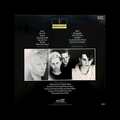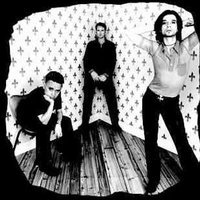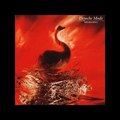Happy 35th Anniversary to Depeche Mode’s debut album Speak & Spell, originally released October 5, 1981.
[Buy via Amazon or iTunes | Stream Below]
Boy George once said “It’s not who does it first. It’s about who does it best.” Synthpop exploded in the late ‘70s, referencing Krautrock and the foundational sound and spirit of Kraftwerk. Gary Numan’s Tubeway Army spilled onto the dancefloor at a time when safety-pinned punks pogoed and gobbed into the faces of Johnny Rotten, Siouxie Sioux and Joe Strummer. Barely legal, the 18-year-old Numan chose Minimoog synths over raucous guitars. He and his army composed songs in the key of dystopian nightmares, creating a fear of the machine’s potential to replace humanity’s role by minimizing its purpose. “Bombers” and “That’s Too Bad” possessed just enough melody to fall into the synthpop category. They sounded like songs, but songs with atonal hooks and mesmerizing analog drones that, with any key firmly pressed, could be sustained indefinitely.
The ‘70s ended with disdain for disco and punk’s first wave ending with a whimper. Hardcore and new wave replaced the deconstructive genre, manifesting itself in ways that resembled punk with a funhouse mirror effect. In 1981, 22 year-old Vince Clarke and 21 year-old Martin Gore treasured Numan’s aesthetics, yet both young men envisioned pop arrangements in place of sci-fi themed despair. Along with Clarke’s former No Romance, Kraftwerk-worshipping partner-in-crime Andy Fletcher, 19-year-old Dave Gahan resembled a rock and roll frontman. His voice, and his presence, allowed Clarke and Gore to bring to light their vision of electropop—a construction rooted in music’s immediate future without the vestiges of its bass-guitar-drums aesthetics.

Originally known as Composition of Sound, the band was renamed Depeche Mode per Gahan’s suggestion, but a band it did not resemble. The conventional drums and guitars were replaced by three guys standing behind primitive synths and a singer swaying to processed sounds taking the traditional instruments places.
Depeche Mode’s debut album Speak & Spell was warmly embraced in Europe. On the other hand, critics in the states were less forthcoming with praise with Rolling Stone’s David Fricke reviling the album for its “microchip bubble gum musings.” The music felt like a failed product launch by Orchestral Manoeuvres in the Dark met with the same disdain and cries of “learn how to play a real instrument,” a clarion call too funny these days, but still repeated by the likes of Arcade Fire’s Win Butler and his all-too-familiar tirades against EDM. Ironic, considering how his band’s 2013 album Reflektor borrowed from the culture he disparaged from a festival stage.
What do critics know about the future of music? Punk and hip-hop were born in the margins, fueled by society’s discontents using whatever means they possessed to create an art form that reflected their environments. More importantly, artists of the two genres made music they wanted to hear, not music they were forced to listen to. Likewise, unknown timbres and fantastic machines tantalized youth to push buttons and configure 808 patterns to make songs that pushed against the past.
Speak & Spell is not perfect. It introduces a band with pop potential exceeding any electronic musician’s expectations. Critics beguile it because what they hear fails to resemble the comfort of what they want to hear. An assault on the senses, it violates the traditions in a culture opposed to traditions. “New Life” destroys rock and roll’s past in ways that the Sex Pistols ruined it. Like Ornette Coleman’s The Shape of Jazz to Come, the definition of what is rock and roll, or what is pop music, became hotly debated. “Operating, generating New Life” does not have the sound of marching boots like Nevermind the Bollocks’ “Holiday in the Sun.” Depeche Mode embrace the past. But the thing is, they do not want to sound like the past, but a future they envision for themselves.
Take the opening keyboard line to “Puppets.” Imagine a guitar performing the same riff and the same musicality bands like Depeche Mode, OMD, and Soft Cell threatened in the misguided imaginations of rock purists remains the same. The analog bass synth line and the Boss Dr. Rhythm drum patterns create old-style forms. Far from Tangerine Dream’s and Brian Eno’s amorphous ambience, the songs on Speak & Spell intend to rage on the dancefloor.
Depeche Mode wrote songs inspired by Kraftwerk’s ethos. Yet, they wrote songs for their generation, like “Dreaming of Me,” a synth-heavy ballad about unrequited love. A proto-Erasure track, hints of Clarke’s love-fueled ballads are found here. Gore leans toward darker textures on “Shout,” providing fans who spin Violatoror Black Celebration more than Speak and Spell with the foundation for their later, more memorable records. On their debut, Gahan sings with a developing 19-year-old’s pipes, more reflective of Numan’s monotone than during his subsequently more mature performances on “Strangelove” or “Enjoy the Silence.”
Someone at Mute probably received a pink slip for burying Speak & Spell’s obvious single at the end of the album. The opening theme of “Just Can’t Get Enough” triggers either joy or homicidal thoughts in most Gen-Xers. The call-and-respond refrain of “I just can’t get enough” repeats like a well-funded Madison Avenue marketing campaign. It sticks. And whether listeners welcome the refrain into their psyche, or if they compulsively vomit like Alex hearing Beethoven in A Clockwork Orange, it sticks. The New Waver’s Universal Dancefloor Anthem was not the first or second single released. It was released six months after the release of their first single “Dreaming of Me.” Again, the shot callers at Mute must have received an earful for not launching that track into the airwaves in the first place.
Clarke left the fold after Speak & Spell’s release. He found Alison Moyet, and together they created “Don’t Go,” another anthem provoking fits of dancing in those who hear it. Lasting the lifespan of a fruit fly, he would eventually find Andy Bell, achieving success with Erasure, including three Top 20 hits in the US. Soon after Clarke’s departure, Depeche Mode replaced him with The Korgis former keyboardist and studio engineer, Alan Wilder. But while Speak & Spell did not augur the stadium tours or multi-platinum albums that would largely define the band’s enduring legacy, it nevertheless leaves tiny breadcrumbs behind it, just little pieces of the Depeche Mode to come.
Az eredeti cikk itt olvasható: http://www.albumism.com/features/tribute-celebrating-35-years-of-depeche-mode-speak-and-spell




